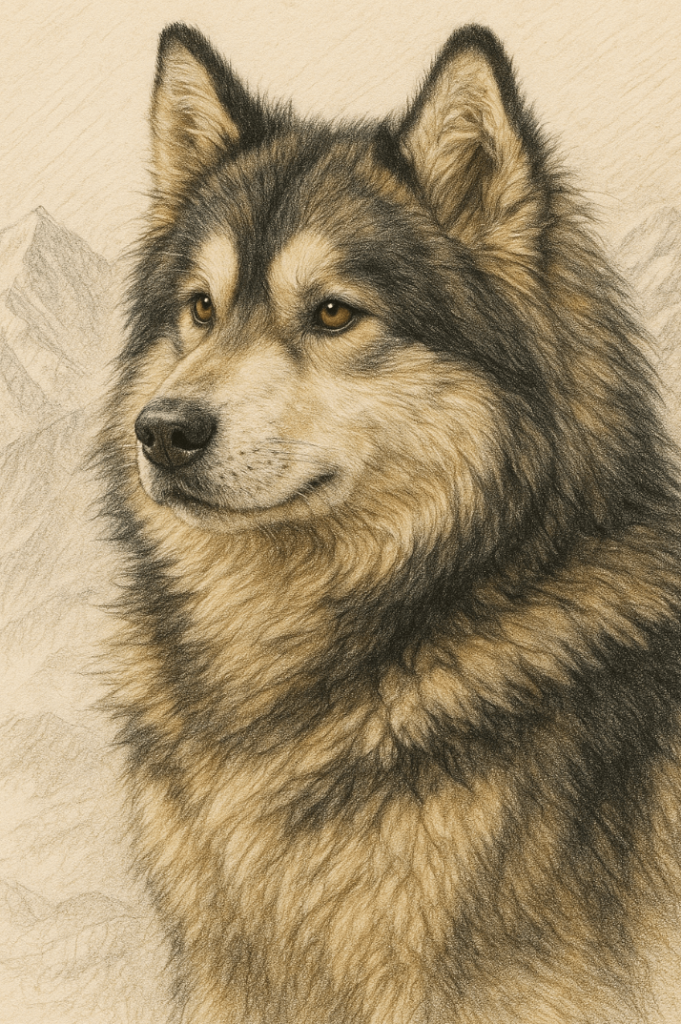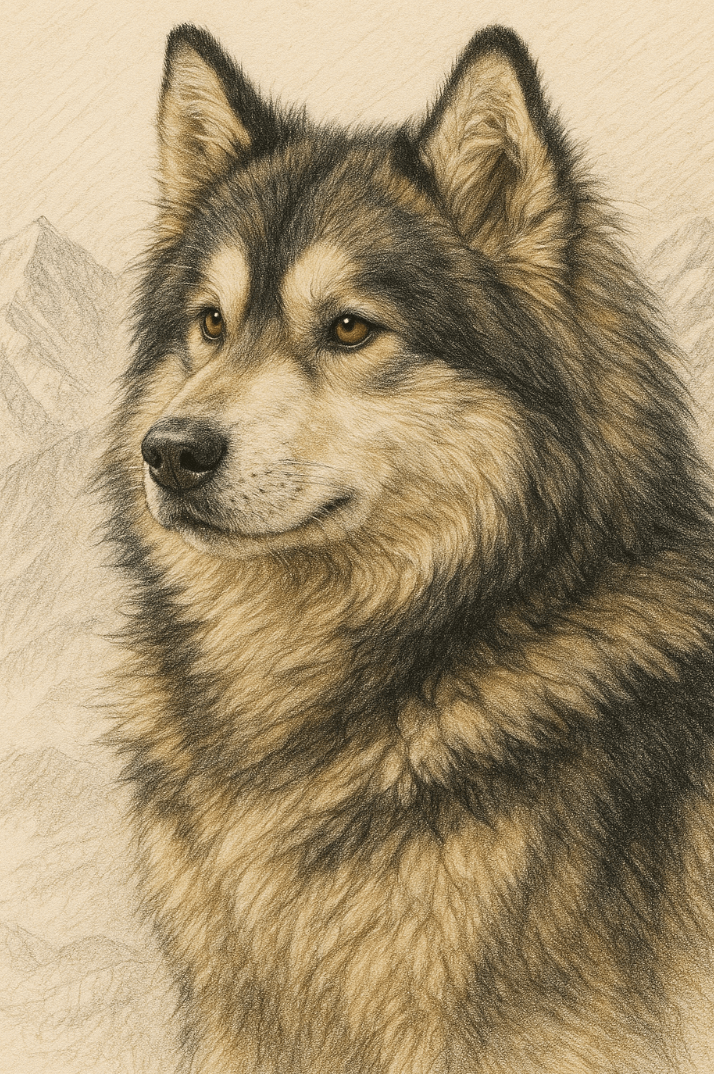Siberian Mountain Dog: A Majestic Companion for Outdoor Enthusiasts
The Siberian Mountain Dog, often mistaken for breeds like the Siberian Husky or Alaskan Malamute, is a remarkable working dog known for its strength, endurance, and loyalty. Originating from the rugged terrains of Siberia, this breed was developed to thrive in harsh climates and assist humans in challenging tasks such as herding, guarding, and sledding.
With their striking appearance, intelligent demeanor, and unwavering devotion, Siberian Mountain Dogs have captured the hearts of dog lovers worldwide. Whether you’re an experienced dog owner or considering adopting one for the first time, understanding this breed’s unique traits and needs is essential for building a harmonious relationship. Let’s dive into everything you need to know about the Siberian Mountain Dog.
Key Characteristics of the Siberian Mountain Dog
The Siberian Mountain Dog is a breed that stands out for its impressive physical and behavioral traits. These characteristics make them well-suited for active families and outdoor enthusiasts.
Powerful Build:
Standing tall with a muscular frame, the Siberian Mountain Dog is built for endurance and strength, capable of handling demanding tasks in rough terrain.Thick Double Coat:
Their dense, weather-resistant coat protects them from freezing temperatures, making them ideal companions for cold climates.Intelligent and Independent:
Known for their sharp minds, these dogs are quick learners but can also exhibit a stubborn streak, requiring consistent training.Loyal and Protective:
Siberian Mountain Dogs form strong bonds with their families and are naturally inclined to protect their loved ones and territory.High Energy Levels:
This breed thrives on physical activity and mental stimulation, needing plenty of exercise to stay happy and healthy.
Understanding these traits helps potential owners determine if the Siberian Mountain Dog is the right fit for their lifestyle.
Caring for Your Siberian Mountain Dog: Essential Tips
Owning a Siberian Mountain Dog comes with responsibilities that ensure their well-being and happiness. Here are some key aspects of care to keep in mind.
Regular Exercise:
Daily walks, runs, or play sessions are crucial to burn off energy and prevent destructive behaviors caused by boredom.Nutritious Diet:
Feed your dog high-quality food rich in protein and fats to support their active lifestyle and maintain their thick coat.Grooming Needs:
Brush their coat at least twice a week to remove loose fur and prevent matting, especially during shedding seasons.Training and Socialization:
Start obedience training early and expose your dog to various environments, people, and animals to foster good behavior.Veterinary Care:
Schedule routine check-ups and vaccinations to monitor their health and address any breed-specific concerns promptly.
By focusing on these care essentials, you can provide a loving and supportive environment for your Siberian Mountain Dog.
Check this guide 👉Discover the Bavarian Mountain Hound: Best 7 Expert Tips!
Check this guide 👉Entlebucher Mountain Dog: Best 7 Expert Tips!
Check this guide 👉Golden Mountain Bernese Dog Price: Best 7 Expert Tips!

Pros of Owning a Siberian Mountain Dog | Cons of Owning a Siberian Mountain Dog |
|---|---|
Loyal and protective family companion | Requires extensive daily exercise |
Thrives in cold climates | Not ideal for small apartments |
Intelligent and trainable | Can be stubborn during training |
Low tendency for excessive barking | Heavy shedding during seasonal changes |
Great for outdoor activities | Needs experienced handling and patience |
Training Challenges and Solutions for Siberian Mountain Dogs
Training a Siberian Mountain Dog can be rewarding but challenging due to their independent nature. Addressing common issues with effective strategies ensures a well-behaved and happy pet.
Challenge: Stubbornness During Training:
These dogs may test boundaries and resist commands. Consistency and positive reinforcement are key to overcoming resistance.Solution: Use High-Value Treats:
Reward desired behaviors with treats or toys they love to motivate compliance during training sessions.Challenge: Strong Prey Drive:
Their hunting instincts can lead to chasing small animals or distractions outdoors.Solution: Leash Training and Recall Practice:
Teach reliable recall commands and practice leash manners to manage their prey drive safely.Challenge: Boredom Leading to Destructive Behavior:
Without adequate stimulation, they may chew furniture or dig excessively.Solution: Provide Mental and Physical Stimulation:
Incorporate puzzle toys, agility courses, and long hikes to keep them engaged and entertained.
With patience and persistence, even the most stubborn behaviors can be managed effectively.
Health Concerns to Watch For in Siberian Mountain Dogs
While generally robust, Siberian Mountain Dogs are prone to certain health issues that owners should monitor closely. Early detection and prevention can significantly improve their quality of life.
Hip Dysplasia:
A common condition in large breeds where the hip joint doesn’t develop properly, leading to arthritis or mobility issues.Bloat (Gastric Torsion):
This life-threatening condition occurs when the stomach twists, requiring immediate veterinary attention.Eye Problems:
Conditions like cataracts or progressive retinal atrophy can affect vision, especially as they age.Skin Allergies:
Their thick coats may trap allergens, causing itching or irritation if not groomed regularly.Joint Issues:
Due to their size and activity level, they may experience strain on joints, necessitating supplements or restricted activity.
Staying vigilant about these health concerns ensures your Siberian Mountain Dog remains healthy and active throughout their life.
Activities to Enjoy with Your Siberian Mountain Dog
Siberian Mountain Dogs thrive on adventure and variety. Engaging in fun activities together strengthens your bond and keeps them physically and mentally stimulated.
Hiking Adventures:
Their stamina and love for exploration make them perfect trail companions.Sledding or Cart Pulling:
Harness their natural pulling instincts by teaching them to pull sleds or carts in snowy conditions.Agility Training:
Set up obstacle courses to challenge their problem-solving skills and athleticism.Swimming Sessions:
Many Siberian Mountain Dogs enjoy water, so swimming can be a refreshing workout option.Play Dates with Other Dogs:
Socializing with friendly dogs helps fulfill their pack-oriented instincts.
These activities ensure your dog stays happy, healthy, and engaged.
Common Misconceptions About Siberian Mountain Dogs
Despite their popularity, several misconceptions surround the Siberian Mountain Dog. Clearing up these myths helps set realistic expectations for prospective owners.
Myth: They’re Just Like Huskies:
While similar in appearance, Siberian Mountain Dogs are larger and bred for different purposes than Huskies.Myth: They Don’t Bark Much:
Though quieter than some breeds, they will vocalize when alerting you to strangers or unusual sounds.Myth: They’re Easy to Train:
Their independence requires experienced handlers and consistent training techniques.Myth: They Don’t Need Grooming:
Their thick coats demand regular brushing to prevent matting and excessive shedding.Myth: They’re Low-Maintenance Pets:
Their high energy levels and need for mental stimulation mean they require significant attention and care.
Understanding the truth behind these myths ensures a smoother ownership experience.
Tips for First-Time Owners of Siberian Mountain Dogs
Bringing home a Siberian Mountain Dog for the first time can feel overwhelming, but these tips will help you navigate the journey successfully.
Prepare Your Home:
Puppy-proof your space by removing hazardous items and creating a designated area for your new pet.Establish a Routine:
Consistent feeding, walking, and sleeping schedules help your dog adjust quickly to their new environment.Invest in Quality Gear:
Purchase durable collars, leashes, and grooming tools designed for large, active breeds.Join a Community:
Connect with other Siberian Mountain Dog owners for advice, support, and shared experiences.Be Patient and Persistent:
Building trust takes time, especially with a breed known for its independence and strong personality.
By following these tips, you’ll create a strong foundation for a lifelong partnership with your Siberian Mountain Dog.
Frequently Asked Questions About Siberian Mountain Dogs
Are Siberian Mountain Dogs good with children?
Yes, they are gentle and protective, making them excellent companions for families with kids when properly socialized.
How much exercise does a Siberian Mountain Dog need?
They require at least 1-2 hours of vigorous exercise daily to meet their high energy demands.
Do they get along with other pets?
With proper introductions and training, they can coexist peacefully with other animals, though their prey drive may pose challenges.
Can they live in warm climates?
While adaptable, their thick coat makes them better suited for cooler environments; extra care is needed in hot weather.
Are they easy to train?
They are intelligent but independent, requiring patient and consistent training methods for best results.
Finding Joy with a Siberian Mountain Dog
The Siberian Mountain Dog is a magnificent breed that combines beauty, intelligence, and loyalty in one incredible package. While they come with specific needs and challenges, their loving nature and adventurous spirit make them wonderful companions for those willing to invest time and effort into their care. By understanding their unique traits, providing proper training and care, and fostering a strong bond, you can enjoy years of companionship with this remarkable breed. If you’re ready for the commitment, a Siberian Mountain Dog could be the perfect addition to your family.
Understanding Cryptosporidium in Cats: Best 7 Expert Tips! – Spot symptoms, treat safely, and stop parasite spread in your home.
Understanding Cryptosporidium in Dogs: Best 7 Expert Tips! – Learn symptoms, treatment & prevention for this stubborn gut parasite.
Understanding Syringomyelia in Cats: Best 7 Expert Tips! – Recognize signs, manage pain, and support your cat’s neurological health with vet-backed guidance.
Understanding Syringomyelia in Dogs: Best 7 Expert Tips! – Expert insights on symptoms, MRI diagnosis, pain management & quality of life.





